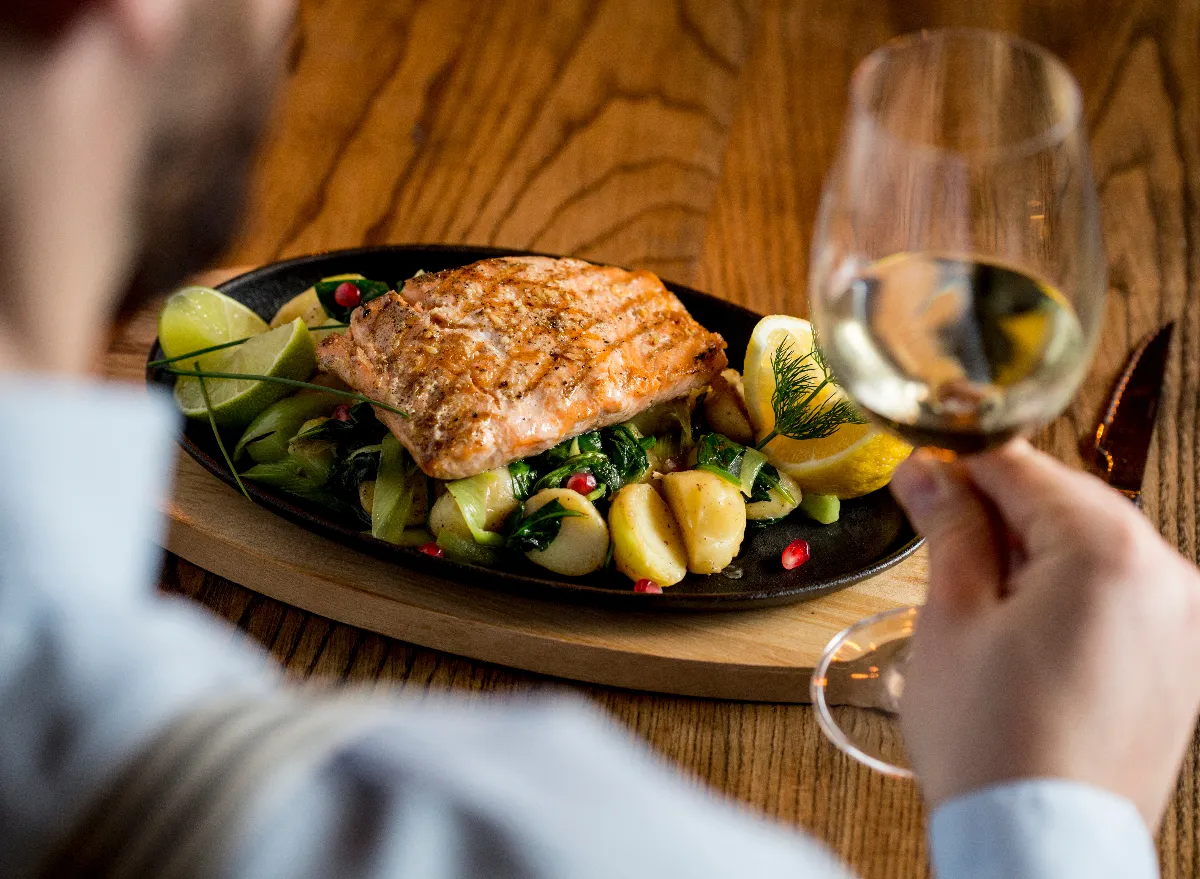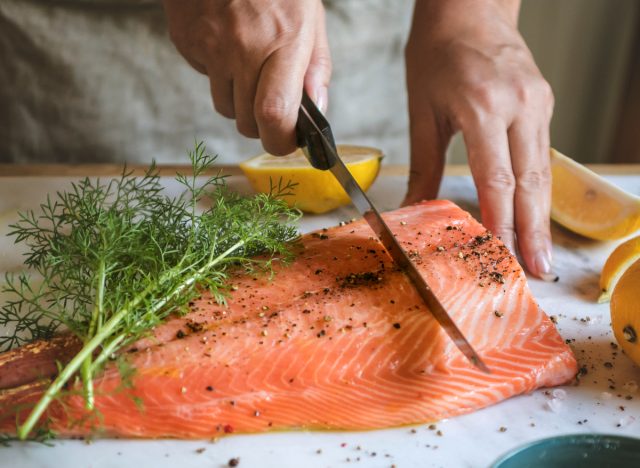The #1 Order to Never Make at a Seafood Restaurant, According to Chefs

Dining out can often entail meals that are excessive in sodium, calories, portions, and price tags, especially if you’re eating at a ritzy steakhouse or a dine-in chain slinging fried chicken or over-the-top tacos. Seafood, despite the fact that high-quality fish and shellfish can entail high price points, is usually a healthier alternative—the key word there being usually.
While the health benefits of eating fish—especially when compared to something like a burger—are numerous, there are some unfortunate industry truths lurking beneath the surface. Like the fact that some seafood is caught illegally, or that oysters can cause illness outbreaks, or that fish is occasionally recalled on a national scale. Despite the health benefits, not all seafood is an automatic win-win of flavor, quality, and frankly, ethics.
Even at high-end restaurants using high-end ingredients, choosing the right item to order can be an iffy matter. Whether basing your decision on sustainability or calorie count, certain nautical ingredients are simply a better bet than others. To find out which order to avoid, we checked in with chefs who know a thing or two about sourcing and serving the best seafood on the market.
For many seafood restaurants worth their sea salt, preserving and showcasing the quality of the product is of the utmost importance. This is especially evident in a seafood-centric city like New Orleans, hallowed ground for seafood destinations like the Red Fish Grill, a French Quarter stalwart where executive chef Chris Vazquez spotlights the best local seafood in ways that don’t bury it under breading.
“Seafood is incredibly versatile and there are endless preparations to enjoy, but I think it is best enjoyed with fresh seasonal vegetables,” says the chef, who suggests avoiding something like a fried shrimp basket, due to high levels of fat, sodium, and calories. A delicious alternative, he notes, is a local specialty like shrimp Creole. “At Red Fish Grill, we serve ours with heirloom tomatoes, fennel, mirliton, celery, onion, bell pepper, and basil, all over quinoa. It’s high in protein and gluten-free for those with dietary restrictions.”
Beyond mere caloric content, though, something that’s even more crucial to avoid is irresponsibly farmed fish—an alarming practice that’s prevalent in more species than one.
According to Craig Riker, executive chef of Finch & Fork in Santa Barbara’s Kimpton Canary Hotel, his no-no is farmed Atlantic salmon. “Oftentimes, these fish are raised in overcrowded and dirty situations,” he notes. “The farmed salmon can be full of antibiotics and prone to containing highly toxic chemicals.”
If you are going to order farmed salmon, Riker recommends ora king salmon from New Zealand, which he serves on his menu. “Ora king is a specially bred and meticulously raised salmon that has superior flavor and texture. It is like the wagyu beef of salmon.”

Troy Guard, owner and executive chef of Denver-based TAG Restaurant Group, emphasizes the importance of ordering fish and seafood, like salmon, that’s sourced sustainably.
“I find it really important to do your research and order seafood from places that use sustainably sourced fish,” says Guard. “I had the amazing opportunity to visit Skuna Bay’s operation in Vancouver and take a tour of what they’re doing to harvest their salmon. There’s a lot of attention and care in how they operate and what is best for the ecosystem and environment.”
He cites Ocean Era, a similar company in his home state of Hawaii, as another laudable business harvesting kampachi in a way that’s environmentally responsible. “From a chef’s perspective, you know what you’re getting is consistent in size and taste and we want to make sure we’re keeping the fish and oceans healthy for future generations to enjoy this delicious product.”
When it comes to avoiding unsustainably sourced fish, Ryley Eckersley of Portland’s Quaintrelle says a good rule to follow is to avoid eating large top predators that should stay in the ocean to help preserve the ecosystem.
“I will get small tuna, but not larger species of tuna, like bluefin, to maintain a healthy ecosystem,” he says. “Also, never eat anything caught by a net that scrapes the bottom of the ocean floor. Another thing to be aware of is where the fish is caught so you aren’t contributing to overfishing, as well as the use of slave labor. On our menu, we use Oregon coast Albacore tuna and squid caught by day-boat fishermen. We purchase from small sustainable, family-owned fisher families, and local tribal-caught salmon.”
At Sunda New Asian, with locations in Chicago and Nashville, executive chef and partner Mike Morales takes a similar approach to farmed fish.
“I typically do not eat tilapia,” he says. “Tilapia are farm-raised in crowded fish pens and are not a healthy food option. There are better alternatives for fish in the world than tilapia. Sourcing fish options at the grocery store or market will be better for your health.”
His suggestions include fish like cod, branzino, and rainbow trout. “At Sunda New Asian, we serve a delicious miso bronzed black cod with a miso glaze, eggplant, herbed oil, and watermelon radish.”
Salmon and tilapia are known to be two of the worst farmed fish species to eat, as they have lower nutritional value and are more likely to be contaminated with harmful pollutants.
Devan Giddix, chef of Dickie Brennan’s Bourbon House in New Orleans, has similar feelings about tilapia, saying “It’s a bland, flavorless fish usually farmed with irresponsible farming methods.” Instead, he suggests ordering something local, like Gulf redfish he serves at his restaurant. “This can help ensure you’re getting the freshest product since it didn’t have to travel far to get to the table.”









